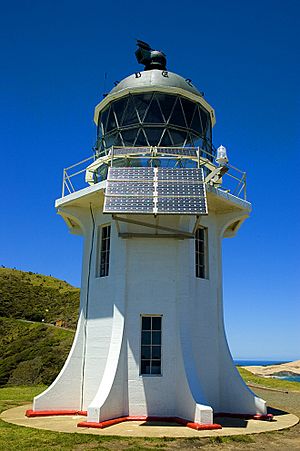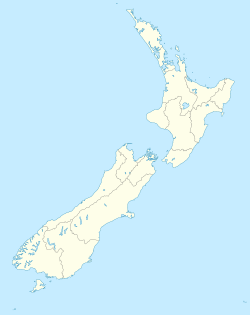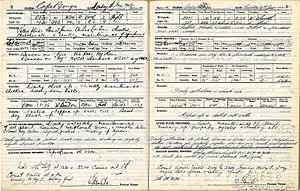Cape Reinga Lighthouse facts for kids
 |
|
|
|
|
| Location | Cape Reinga North Island New Zealand |
|---|---|
| Coordinates | 34°25′35.9″S 172°40′39.5″E / 34.426639°S 172.677639°E |
| Year first constructed | 1941 |
| Year first lit | 1941 |
| Automated | 1987 |
| Construction | concrete tower |
| Tower shape | octagonal tower with balcony and lantern |
| Markings / pattern | white towe, black dome lantern |
| Height | 10 metres (33 ft) |
| Focal height | 165 metres (541 ft) |
| Range | 19 nautical miles (35 km; 22 mi) |
| Characteristic | FL W 12s |
| Admiralty number | K3688 |
| NGA number | 3796 |
| ARLHS number | NZL-012 |
The Cape Reinga Lighthouse is a famous lighthouse located at Cape Reinga in the northern part of New Zealand. It stands on the very tip of the North Island. This lighthouse helps ships find their way safely along the coast. It is owned and operated by Maritime New Zealand. The lighthouse is a well-known symbol of New Zealand. Many tourists visit the area, but the lighthouse itself is not open to the public.
Contents
History of the Cape Reinga Lighthouse
The Cape Reinga Lighthouse was built in 1941. Its light was first turned on in May of that year. This lighthouse was the last one in New Zealand to have people living and working there.
Why a New Lighthouse Was Built
Before this lighthouse, there was another one nearby. It was called the Cape Maria Van Diemen Lighthouse. That lighthouse was built in 1879 on Motuopao Island. Getting to the old lighthouse was very difficult. The seas around the island were often rough and dangerous. Because of these safety concerns, a decision was made in 1938. They decided to move the lighthouse to Cape Reinga. This new location was much safer and easier to reach.
How the Lighthouse Worked
The new lighthouse at Cape Reinga used parts from the old one. The complete lantern fittings from Motuopao Island were moved and reused. However, the new lighthouse got a powerful new lamp. It was a 1000-watt electric lamp. This lamp could be seen from 26 nautical miles away. That's about 48 kilometres! A diesel generator provided the power for the lamp.
Automation and Modern Changes
In 1987, the Cape Reinga Lighthouse became fully automated. This means machines took over the work. The lighthouse keepers, who used to live and work there, were no longer needed. Today, the lighthouse is watched over from far away. It is monitored remotely from Wellington, New Zealand's capital city.
In May 2000, the original lamp and lens were replaced. A smaller, more modern 50-watt beacon was installed. This new beacon uses batteries for power. These batteries are recharged by solar cells, which get energy from the sun. The beacon flashes every 12 seconds. Its light can be seen from 19 nautical miles away. That's about 35 kilometres.
 | Bayard Rustin |
 | Jeannette Carter |
 | Jeremiah A. Brown |



